Monthly Updates on Recent Books in the History of Christianity
To raise awareness of recent books in the history of Christianity, the editorial staff of Church History: Studies in Christianity and Culture highlights each month a list of 10-15 books in diverse periods and geographical regions that we hope will be of interest to our members. We include here below the 45th monthly list, chosen by our staff, with excerpts from the publishers’ blurbs.
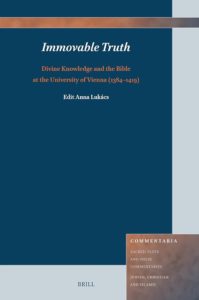
Edit Anna Lukács, Immovable Truth: Divine Knowledge and the Bible at the University of Vienna (1384-1419). 2024
In the 14th century, hypotheses about a lying God, deceived Christ, and the changeability of the past circulated. At the new University of Vienna, three German masters attempted in their lectures on the Old Testament to counter them. Their commentaries are the longest, the most influential, and perhaps even the most inspiring commentaries on the Bible written at Vienna.
This book offers a glimpse into their most unusual ideas, apocalyptic expectations, heretics, toads, and devils; assessments of Amalric of Bena, Moshe Taku, and Petrarch; and, last, but not least, the search for an immovable truth that fills their pages.
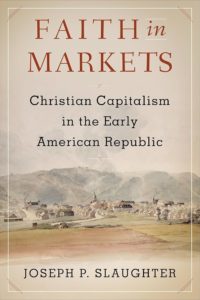
Joseph P. Slaughter, Faith in Markets: Christian Capitalism in the Early American Republic. 2023
In the first half of the nineteenth century, the United States saw both a series of Protestant religious revivals and the dramatic expansion of the marketplace. Although today conservative Protestantism is associated with laissez-faire capitalism, many of the nineteenth-century believers who experienced these transformations offered different, competing visions of the link between commerce and Christianity. Joseph P. Slaughter offers a new account of the interplay between religion and capitalism in American history by telling the stories of the Protestant entrepreneurs who established businesses to serve as agents of cultural and economic reform.
Faith in Markets examines three Christian business enterprises and the visions of a Christian marketplace they represented. Shaped by Pietist, Calvinist, and Arminian theologies, each offered different answers to the question of what a moral, Christian market should look like. George Rapp & Associates operated sophisticated textile factories as the business side of the model community the Harmony Society, which practiced communal living in pursuit of a harmonious workforce. The Pioneer Stage Coach Line provided transportation services only six days a week to keep Sunday sacred, attempting to reform society by outcompeting less pious businesses. The publisher Harper & Brothers sought to elevate American culture through commerce by producing virtuous products like lavishly illustrated Bibles. Drawing on a wide range of sources, Faith in Markets explores how the founders and owners of these enterprises infused their faith into their businesses and, in turn, how distinctly religious businesses shaped American capitalism and society.
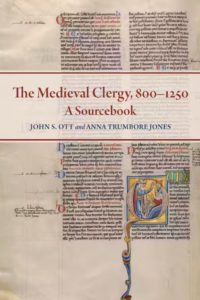
John S. Otto and Anna Trumbore Jones, eds. and trans. The Medieval Clergy, 850-1250: A Reader. 2024
Pontifical Institute of Medieval Studies
The Medieval Clergy is a collection of documents from the ninth to thirteenth centuries by and about the so-called secular clergy – a group that included priests, bishops, deacons, and canons, whose primary responsibilities included ministering to laypeople.
For most medieval people, these clergy stood at the center of religious life: they served as the face of the church and the link between the faithful and God, between this life and the next. These clerics administered the sacraments, and their churches sheltered the poor, housed the relics of the saints, and offered places of protection and community. The documents collected here allow readers to explore the richness of the lives of these clergy: the ideals they strove to emulate, the complexity of their lived experiences, and the multifaceted roles they played – pastoral, sacramental, familial, social, educational, liturgical, memorial, military, economic, legal, and civic. Most of the documents here appear for the first time in English; the collection also includes dossiers of interconnected documents that allow students and non-specialists to explore individuals, ideas, and historical contexts in depth.
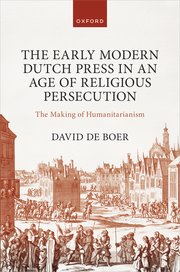
David de Boer, The Dutch Press in an Age of Religious Persecution: The Making of Humanitarianism. 2023
For victims of persecution, attracting international awareness of their plight is often a matter of life and death. This book uncovers how in seventeenth-century Europe, persecuted minorities first learned how to use the press as a weapon to combat religious persecution. To mobilize foreign audiences, they faced an acute dilemma: how to make people care about distant suffering? This study argues that by answering this question, they laid the foundations of a humanitarian culture in Europe. The book reveals how, as consuming news became an everyday practice for many Europeans, the Dutch Republic emerged as an international hub of printed protest against religious violence. It traces how a diverse group of people, including Waldensian refugees, Huguenot ministers, Savoyard officeholders, and many others, all sought access to the Dutch printing presses to raise transnational solidarity for their cause. By examining their publicity strategies, this study deepens our understanding of how people tried to confront the specter of religious violence that had haunted them for generations.
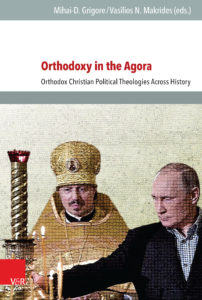
Mihai-D. Grigore and Vasilios N. Makrides, eds. Orthodoxy in the Agora: Orthodox Christian Political Theologies Across History. 2024
The radical socio-political changes in the wake of the fall of communism in many predominantly Orthodox countries of Eastern and Southeastern Europe have triggered an intense interest in formulating a specifically Orthodox Christian political theology in various forms. The present volume focuses on these developments, but also offers a panorama of the evolution of Orthodox political theologies across time, from early Byzantium until today. The contributions examine their historical background, consider their specific parameters, and critically assess their particular features. Given that political theology has a much more robust history within Western Christianity, some contributions contextualise the topic more broadly by comparing Orthodox with Western Christian political theologies. Considering that the analysis of the Orthodox side has been mostly neglected or ignored in the past, this volume aims at filling a serious gap in the related research.
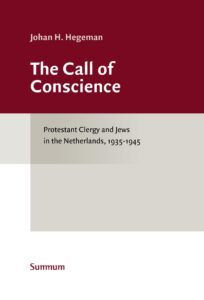
Johan Hegeman, The Call of Conscience: Protestant Clergy and Jews in the Netherlands, 1935-1945. 2024
Recalling Protestant missionary work among Jews and assistance to Jewish refugees before the war, Dr. Hegeman dissects the various positions taken by the clergy during World War II. He discusses the clergy’s resistance documents and analyzes the morality used. The result is a unique portrayal of the clergy’s struggle with conscience as they faced Nazi persecution of Jews during the war. The plight of the Jews who belonged to the churches is addressed.
This study is the first comprehensive English-language treatment of the attitudes of Dutch Protestant clergy toward the Jews in the period before and during World War II.
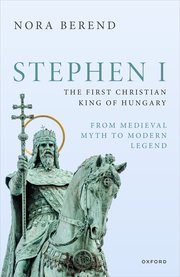
Nora Berend, Stephen I, the First Christian King of Hungary: From Medieval Myth to Modern Legend. 2024
Stephen I, Hungary's first Christian king (reigned 997-1038) has been celebrated as the founder of the Hungarian state and church. Despite the scarcity of medieval sources, and consequent limitations on historical knowledge, he has had a central importance in narratives of Hungarian history and national identity. This book argues that instead of conceptualizing modern political medievalism separately as an 'abuse' of history, we must investigate history's very fabric, because cultural memory is woven into the production of the medieval sources. Medieval myth-making served as a firm basis for centuries of further elaboration and reinterpretation, both in historiography and in political legitimizing strategies. In many ways we cannot reach the 'real' Stephen, but we can do much more to understand the shaping of his myths.
The author traces the origin of crucial stories around Stephen, contextualizing both the invention of early narratives and their later use. A challenger to Stephen's rule who may be a medieval literary invention became the protagonist of a rock opera in 1983, also standing in for Imre Nagy, a key figure of the 1956 revolution; moreover, he was reinvented as the embodiment of true Hungarian identity. The alleged right hand relic was 'discovered' to provide added legitimacy for Hungary's kings and then became a protagonist of the entanglement of Church and state. A medieval crown was invested with supernatural status, before turning into a national symbol. This book analyses the often seamless flow that has turned medieval myth into modern history, showing that politicisation was not a modern addition, but a determinant factor from the start.
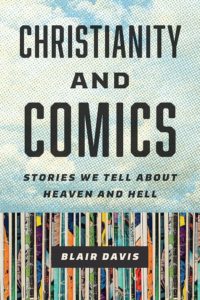
Blair Davis, Christianity and Comics: Stories We Tell About Heaven and Hell. 2024
The Bible has inspired Western art and literature for centuries, so it is no surprise that Christian iconography, characters, and stories have also appeared in many comic books. Yet the sheer stylistic range of these comics is stunning. They include books from Christian publishers, as well as underground comix with religious themes and a vast array of DC, Marvel, and Dark Horse titles, from Hellboy to Preacher.
Christianity and Comics presents an 80-year history of the various ways that the comics industry has drawn from biblical source material. It explores how some publishers specifically targeted Christian audiences with titles like Catholic Comics, books featuring heroic versions of Oral Roberts and Billy Graham, and special religious-themed editions of Archie. But it also considers how popular mainstream comics like Daredevil, The Sandman, Ghost Rider, and Batman are infused with Christian themes and imagery.
Comics scholar Blair Davis pays special attention to how the medium’s unique use of panels, word balloons, captions, and serialized storytelling have provided vehicles for telling familiar biblical tales in new ways. Spanning the Golden Age of comics to the present day, this book charts how comics have both reflected and influenced Americans’ changing attitudes towards religion.
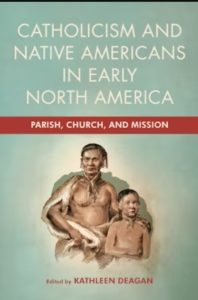
Kathleen Deagan, ed. Catholicism and Native Americans in Early North America: Parish, Church, and Mission. 2024
University of Notre Dame Press
Catholicism and Native Americans in Early North America interrogates the profound cultural impacts of Catholic policies and practice in La Florida during the sixteenth and seventeenth centuries.
Catholicism and Native Americans in Early North America explores the ways in which the church negotiated the founding of a Catholic society in colonial America, beginning in St. Augustine, Florida, in 1565. Although the church was deeply involved in all aspects of daily life and institutional organization, the book underscores the tensions inherent in creating and sustaining a Catholic tradition in an unfamiliar and socially diverse population.
Using new primary academic scholarship, the contributors explore missionaries’ accommodations to Catholic practice in the process of conversion; the ways in which social and racial differentiation were played out in the treatment of the dead; Native literacy and the production of religious texts; the impacts of differing conversion philosophies among various religious orders; and the historical and theological backgrounds of Catholicism in sixteenth- and seventeenth-century America. Bringing together insights from archaeology, social history, linguistics, and theology, this groundbreaking volume moves beyond the missions to reveal how Native people, friars, secular priests, and Spanish parishioners practiced Catholicism across what is now the southeastern United States.
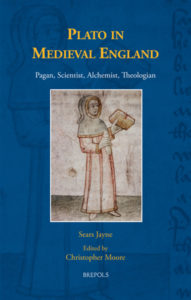
Sears Jayne, Plato in Medieval England: Pagan, Scientist, Alchemist, Theologian. Ed. Christopher Moore. 2024
From the time of the Roman Republic, continental Europeans traveling to England brought knowledge of Greek and Roman intellectual culture in the form of books of every genre. But, until 1111 CE, the island contained not a single Platonic dialogue. And for the next two centuries, it had only a partial Latin translation of the Timaeus. A Latin Phaedo eventually appeared, in 1340, and the Meno in 1423. But this hardly limited the number of ideas people had about Plato. He was a proto-Christian, a sage, a scholar of the cosmos, and a healer. And he had an elaborate oeuvre that did exist in England, works of astrology, numerology, medicine, and science, including Cado, Calf, Circle, Herbal, Question, Alchemy, and Book of Prophecies of a Greek King.
This book tells the story of Plato in Medieval England, from a name with too few works to a sage with too many. Based on a complete survey of all extant manuscripts, publications, and library records until the fifteenth century, it traces with extraordinary precision the movement of opinions and information about Plato from Europe to England and then into its various monasteries, schools, and universities. This erudite and illuminating sociology of knowledge provides novel insight into the dubious English career of our best-known philosopher. This is intellectual history and reception studies at its most surprising.
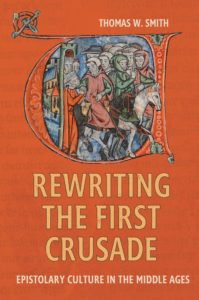
Thomas W. Smith, Rewriting the First Crusade: Epistolary Culture in the Middle Ages. 2024
The letters stemming from the First Crusade are premier sources for understanding the launch, campaign, and aftermath of the expedition. Between 1095 and 1100, epistles sustained social relationships across the Mediterranean and within Europe, as a mixture of historical writing, literary invention, news, and theological interpretation. They served ecclesiastical administration, projected authority, and formed focal points for spiritual commemoration and para-liturgical campaigns.
This volume, grounded on extensive research into the original manuscripts, and presenting numerous new manuscript witnesses, argues that some of the letters are post hoc "inventions", composed by generations of scribe-readers who visited crusading sites from the twelfth century on, adding new layers of meaning in the form of interpolations and post-scripts. Drawing upon this new understanding, and blurring the distinction of epistolary "reality", it rewrites central aspects of the history of the First Crusade, considering the documents in a new way: as markers of enthusiasm and support for the crusade movement among monastic clergy, who copied and consumed them as a form of scribal crusading. Whether authentic letters or literary "confections", they functioned as communal sites for the celebration, commemoration and memorialisation of the expedition.
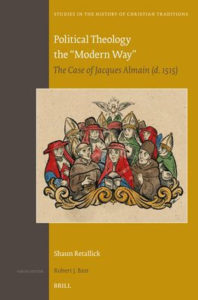
Shaun Retallick, Political Theology the “Modern Way:” The Case of Jacques Almain (d. 1515). 2024
Shaun Retallick provides the first monograph on this late medieval philosopher-theologian and conciliarist and his thought. He demonstrates that Almain's political theology, of which ecclesiology is a sub-discipline, is strongly impacted by the Via moderna. At the heart of his political theology is the individual and his or her will. Yet, the individual is rarely viewed in isolation from others; there is a strong emphasis on community and on the religious and secular bodies through which it is realized. But these bodies, including the Church, are understood in collectivist rather than corporatist terms, which tends to a quite radical form of conciliarism.”
Finally, for staying up-to-date on the latest titles in all fields, we recommend regularly perusing New Books Network and its "New Books in Christian Studies” page. These pages are updated regularly.
